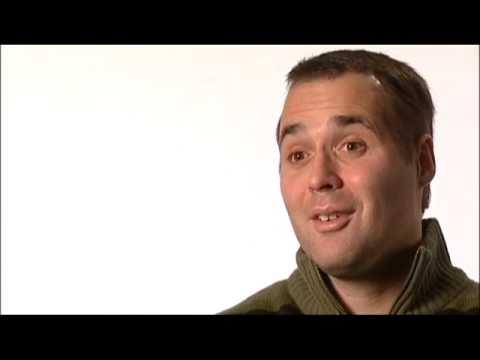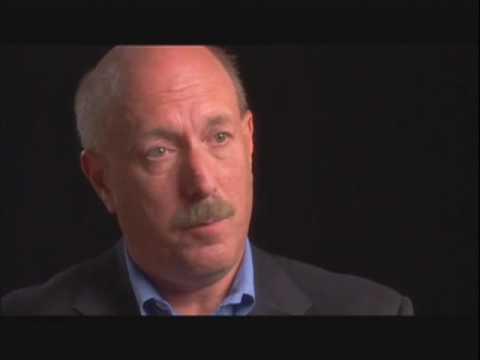Steve V.
I was diagnosed right about Thanksgiving 1989, and immediately had surgery to remove the tumor in my leg. I went through three months of chemotherapy, and then they went back in and took more muscle tissue that was surrounding the area where the tumor was. I had six more months of chemotherapy and six weeks of radiation in the area. The chemotherapy and the radiation were all preventative. It hadn’t spread anywhere, but the type of cancer that I had has a high chance to metastasize to the lungs, in particular.
My right leg’s a little smaller in diameter than my left leg, and it’s a little weaker. That’s one of the physical side effects. I’d like to think that I could blame my lack of a vertical leap on my smaller muscle. I used to be a competitive beach volleyball player. But I think it’s just as much to do with age as it is the muscles being removed. But I can’t quite jump as high as I used to.
You always hear about the cancer returning and different types of cancer have different time periods where they consider you cured. Most of them are five years. After the first year, my doctor told me, “If it’s going to spread, it’s going to spread to your lungs or another part of your body. Probably either while you’re getting treatment or right after you finish.” So of course, when I first stopped my treatments, I was worried about it. You wake up in the middle of the night thinking about it. But after the first year, it gradually faded away until it got to the point that I never really thought about it again until my sister was diagnosed, and now my son’s being treated for cancer.
I experienced something called “cancer survivor’s guilt.” I’d never really seen that terminology in print before. My doctors and nurses would always go to my room and comment on what a great attitude I had, so they had me come in and speak to a lot of the newly diagnosed cancer patients. One of them was a guy about my age that was a local businessman in Virginia Beach. I kept telling him, “Bubba, you’re going to be fine. Everything’s going to work out. You’ll go through this, and your life will get back to normal.” And he passed away. Then about two years later, my sister was diagnosed with cancer, and I gave her the whole speech and told her attitude is one of the most important things. She fought it and went into remission. And then about six months later, it came back and she fought it again. She tried to fight it again the third time, but she passed away. That’s where the survivor’s guilt has gotten me. I’ve lost two people that I was close to. And it makes you sit back and wonder, “Why did I survive? What made me beat it and the other people not beat it?” It’s always nagging on you. How does one person get chosen to be a survivor, and one person not?
After I lost my sister, I just completely withdrew myself from the cancer community and stopped trying to give pep talks to people. My son is six years old and has leukemia. With my son’s diagnosis, I got involved in the advocacy side of the cancer community. That’s when I signed up for the Tour of Hope. The purpose of the Bristol-Myers Squibb Tour of Hope is to raise awareness about the importance of clinical trials in the fight against cancer. Children participate in clinical trials at a much higher level than adults do, and the childhood cancer survival rates have increased dramatically over the last 10 years. If we can get more adults to participate in clinical trials, there’s a high degree of optimism that the survival rate of cancer in the adults will increase likewise. There are a lot of good drugs out there that are being developed by the pharmaceutical companies that are sitting in laboratory freezers waiting to be tested. One of them could be the cure for cancer. And without clinical trials, they can’t bring them to market.
I think without a doubt, being a caregiver for a cancer patient is harder than being a patient, and I can see that from both sides. I didn’t realize what an impact it was on my family to help me through it and support me through it until my sister was diagnosed. And then when your child is diagnosed, it’s even harder for a parent, of course. But you’ve got to be there to support them in moments of doubt. Be willing to talk to them. My parents were unwilling to talk about it. They were like, “If we don’t talk about it, everything will be fine.” But I think a lot of cancer patients want to talk about it. They want to be reassured. They want to see other people that have survived.
I have a real hard time with how a life insurance company can ask you, “Have you ever been diagnosed with cancer?” For the first few years after I was diagnosed, I couldn’t get life insurance. They can deny you coverage and that just doesn’t seem right. You’ve been a cancer patient, and now you’re a survivor. You’ve been through all that. And now it’s an extra slap in the face that you can’t get life insurance. I can certainly see, “Have you ever smoked?” Or, “Do you dive out of airplanes?” Things the applicant has control over. But things that have happened beyond their control shouldn’t be held against them. You shouldn’t be denied coverage for life insurance or health insurance. That’s something that lawmakers should correct.
I’m in Washington, D.C., for Livestrong™ Day. I’m here from Virginia to meet with some state representatives and educate them about the purpose and the mission of the Lance Armstrong Foundation, how important Livestrong Day is, and how important the survivorship programs of the Lance Armstrong Foundation are. I’ve learned a lot more about the Lance Armstrong Foundation over the last two years. It is a vital resource for people. Probably about once a week, someone calls me because they know about my involvement with the Lance Armstrong Foundation, and they ask me, “Can you point me in that direction?” They have a friend that was diagnosed, what should they do? How do they learn about the disease? Where can they go to get information? Who can they talk to? And I point them to the Livestrong Web site immediately.
Movements always start off small. It’s hard to start at the top, whether it’s with pharmaceutical companies, health insurance companies, the Congress, or different levels of government. Movements have to start with the people, and getting the word out to your local community, rallying the support, and talking to people that have been touched by cancer is the perfect way to start this kind of a program.
I really didn’t do a lot of investigation when I was diagnosed. It was 15 years ago and the Internet wasn’t popular. It was hard to get information. I just followed my doctor’s advice. He said, “You need to have surgery and you need to have it tomorrow.” I didn’t go out and get a second opinion or try to do any research. I think it’s very important that people do that for their own peace of mind, if nothing else. My son was scheduled to receive a really high degree of cranial radiation. We did a lot of research and found out the negative consequences of that: cognitive decreases and physical growth problems. So we did some research and found there was a clinical trial that had just completed where they lowered the doses of radiation. The survival rates were just as good, but they didn’t have the severe side effects. So we convinced our doctors to use lower levels of radiation. That kind of information is available out there to people.
Survivorship means a lot of things. The most important thing is giving something back. You feel like you were lucky enough to be a survivor. You owe it to the cancer community to give something back and help others become survivors.
Livestrong embodies the whole survivorship attitude. Don’t just survive. Don’t just lie in a hospital bed. While you’re getting your treatments, you can still be active. You can be more active. You even view that as a challenge, an opportunity to turn your life around. There are a lot of people whose diets aren’t as good as they should be. They don’t exercise as much as they should. I see a lot of survivors that take that as a wakeup call. You have to get your body and mind in shape to beat cancer. And then people stay with it.
My name is Steve Verbanic, and I am a 16-year liposarcoma survivor.


